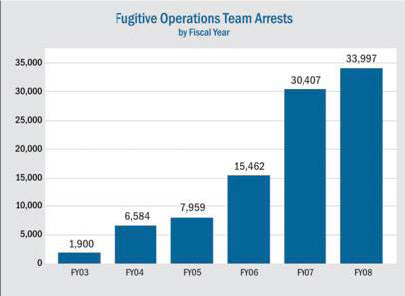Archived Content
In an effort to keep ICE.gov current, the archive contains content from a previous administration or is otherwise outdated. This information is archived and not reflective of current practice.
ICE fugitive operations teams nab 104 illegal aliens following a five-day targeted enforcement action in the Carolinas and Georgia
CHARLOTTE, NC - U.S. Immigration and Customs Enforcement (ICE) announced today that a five-day targeted fugitive operation that culminated Friday in the Carolinas and Georgia netted 104 fugitive aliens and immigration violators.
Among those arrested were 94 fugitives who ignored lawful orders of removal and went into hiding and 10 other immigration violators. Of the 104 arrested, 23 had prior criminal convictions for crimes including drug possession, stolen goods possession and indecent liberties with a child.
"We will continue conducting these targeted fugitive operations to arrest and deport those in violation of U.S. immigration law," said Felicia Skinner, acting field office director for the ICE Office of Detention and Removal in Atlanta. "Our message is clear: avoid arrest by complying with the law."
Raymundo Chavez-Maldonado was among those arrested during the five-day effort. Chavez-Maldonado was arrested without incident on Nov. 18 at his home in Clayton, North Carolina. He had been previously ordered deported by an immigration judge on Oct. 29, 2005 and had been a fugitive since then. Chavez-Maldonado has a prior arrest for indecent liberties with a child.
Also arrested was Jose Refugio Muniz a fugitive ordered deported in Jan 2006. Muniz, who has an extensive criminal history, was arrested at his home in Hendersonville, NC without incident. Muniz's prior arrests and convictions include misdemeanor larceny; felony possession of marijuana; possession of drug paraphernalia; felony possession of schedule IV drug and possession of stolen goods.
Both Chavez-Maldonado and Muniz are in ICE custody awaiting their imminent removal to their respective country of origin.
The National Fugitive Operations Program (NFOP) is responsible for reducing the fugitive alien population in the United States. An ICE fugitive is defined as an alien who has failed to depart the United States pursuant to a final order of removal, deportation, or exclusion; or who has failed to report to an ICE officer after receiving notice to do so.
ICE's databases show the targeted enforcement strategy is paying off as the nation's fugitive alien population continues to decline. At the end of FY 2008, there were approximately 558,000 fugitive alien cases-a decrease of nearly 37,000 since the beginning of the fiscal year. This is a historic reversal of the previous growth trend in fugitive cases. Much of the credit for those results can be attributed to the rapid expansion of the program. When the initiative was launched in 2003, there were eight fugitive operations teams nationwide. Today, ICE has approximately 100 fugitive operations teams deployed nationwide to pursue these types of cases. In FY 2008, those teams accounted for more than 34,000 arrests, more than double the total just two years ago.
ICE Fugitive Operations Teams are a crucial part of the agency's interior immigration enforcement mission. A critical element of this strategy is to identify, locate, arrest and remove criminal aliens, fugitives, and other immigration violators from the United States. These teams use intelligence-based information and leads to find and arrest aliens who have been ordered to leave the country by an immigration judge, but have failed to comply - thus making them fugitive aliens.
In June of 2006, DRO created the Fugitive Operation Support Center (FOSC) to enhance the efficiency and effectiveness of the National Fugitive Operations Program (NFOP). The FOSC, through the use of technology and partnerships with law enforcement agencies, serves as a force multiplier for the National Fugitive Operations Program (NFOP). The FOSC reviews and updates fugitive cases, develops leads for and provides assistance to Fugitive Operations Teams, assists in developing national fugitive Field Operations, and supports national ICE initiatives.


